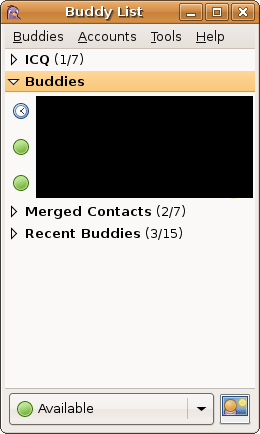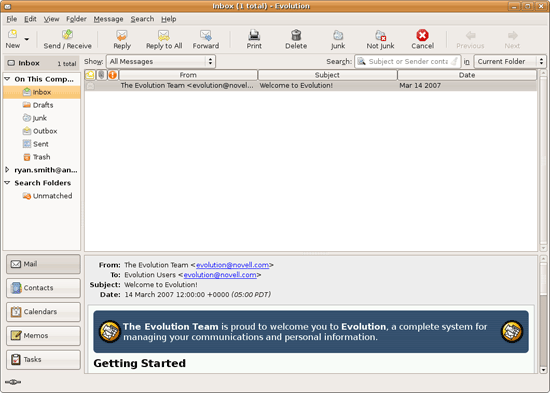Revisiting Linux Part 1: A Look at Ubuntu 8.04
by Ryan Smith on August 26, 2009 12:00 AM EST- Posted in
- Linux
Applications: Communication - Email & Instant Messaging
Windows Default: Windows Mail/Outlook
What I Use: Outlook
Ubuntu Default: Evolution
Separate communication suites are a bit of a dying breed these days, largely due to the aforementioned rise of the web browser. Thanks to services like Gmail, web based email has taken a massive dent out of the need to use an email client, and new services are popping up that are starting to do the same for instant messaging. But they’re not dead yet, and more importantly I’m too old fashioned to give up my dedicated email and instant messaging clients, so this is a matter I consider important.
The default email client on Ubuntu is Evolution, a clone of Outlook. As Outlook is my default email client under Windows anyhow, this worked out quite well for me. Because Evolution is an Outlook clone, it features not just email, but contact lists and calendaring too, supplanting the need for separate applications for those under Ubuntu.
At the same time, because Evolution is an Ubuntu clone, there’s not a lot I can say about it – it’s a clone, there’s not much unique to it. What it is however is a good clone when it comes to my needs. Credit is due where deserved in cloning the monster that is Outlook, because Evolution did email, contacts, and calendaring for me just as well as Outlook does.
The only notable issue I had with Evolution is that it does not have a way to import Outlook PST files. It’s possible to do it, but it involves using Mozilla’s Thunderbird email client as an import/export mechanism. To be clear I’m not faulting Evolution here since PST is a closed Microsoft format.
Users coming from Windows Mail will be a bit less at home, but at the same time Evolution is likely an improvement for them for all the same reasons that Outlook is a better client than (and the de-facto Windows email client in place of) Windows Mail. Perhaps a more direct benefit is that since Evolution is pre-installed with the base OS installation, you don’t need to go hunt down a real email application after the OS installation. Never underestimate the annoyance of having to install more software.
If this description seems short, it’s not for the lack of effort or a dislike of Evolution. In fact I’m plenty happy with it, but as I use it it’s just Outlook with a different GUI. So far as I’m concerned this is a good - if unexciting – thing when coming from Windows and Microsoft Office.
Final Verdict: Meets My Needs
Windows Default: None/Windows Live Messenger
What I use: Trillian
Ubuntu Default: Pidgin
Somewhere along the way to Vista, Microsoft decided to decouple some applications from the OS, MSN Messenger was one of them. As a result Vista does not come with an instant messaging client of any kind, rather it comes with a link to go download the latest version of Windows Live Messenger. Not that it would necessarily be of much use, the last time I saw any statistics for instant messaging network usage, the vast majority of North American users were on AOL’s AIM network. In this case Windows may as well not have an official instant messaging client, because unless you use the MSN network (or Yahoo network) there’s no practical difference.
So it’s a nice change of pace when we note that Ubuntu comes with a multi-protocol instant messaging client as part of the base OS install. Pidgin (née GAIM) supports AIM, Yahoo, ICQ, MSN, and a boatload of smaller networks, thoroughly eliminating any possible problem of not being able to connect to your network of choice. Like Firefox, Pidgin is another significant multi-platform application, and is found on Windows and Mac OS X too.

Moving on to features, Pidgin hits all of the checkboxes as far as requisite features are concerned. Buddy lists, chat logging, file transfers, emoticons, end-to-end encryption, etc are all supported. What helps to set Pidgin apart from other clients, and this one again drawing a parallel to Firefox, is its support for plugins. Plugins aren’t new as far as instant messaging clients are concerned, but many clients don’t support them.
Pidgin comes with 30 such plugins, ranging from tools to integrate Pidgin with Evolution, to adding support for mouse gestures. Some of these are standard features in other IM clients, so clearly not all 30 plugins are by any means unique. I’m also going to throw built-in spell-checking in this category – not new, but sorely missed from a lot of clients.
Coming from Trillian, Pidgin is effectively a drop-in replacement. The two don’t have feature parity (Trillian has more features, specifically audio/visual chatting) but as far as I use either client, I don’t use anything that makes the two notably different once a few plugins are installed. Much like Evolution there’s undoubtedly some missing features once you get deeper that would be of concern to the hardcore users, but it’s nothing that rears its head for me.
Final Verdict: Meets My Needs











195 Comments
View All Comments
ultraseksy - Tuesday, March 13, 2012 - link
i agree this is a brilliant site with lots of great content which i love thanks<a href="http://www.sendfreetext.info">send free text</a>
<a href="http://www.myplussizelingerie.co.uk">plus size lingerie</a>
<a href="http://www.uktrollbeads.co.uk">uk troll beads</a>
ultraseksy - Tuesday, March 13, 2012 - link
http://www.sendfreetext.info send free texthttp://www.myplussizelingerie.co.uk plus size lingerie
http://www.uktrollbeads.co.uk uk troll beads
juweliefol - Tuesday, April 24, 2012 - link
8.04 is a long LTS release, still there are lots of people are using.http://www.elegantpark.co.uk/wedding-dresses/a-lin...
xinxin - Friday, August 31, 2012 - link
If this article was a private work of the author to provide him an answer on whether he may or may not move to Linux, people should advise him the above mentioned. As for an article intended to be read by thousands it must be pointed out that it's conclusion is a miss lead.It is really nice.http://www.shortweddingdressus.com">http:/...http://www.shortweddingdressus.com
xinxin - Friday, August 31, 2012 - link
Nice website.I wish more works.http://www.shortweddingdressus.com